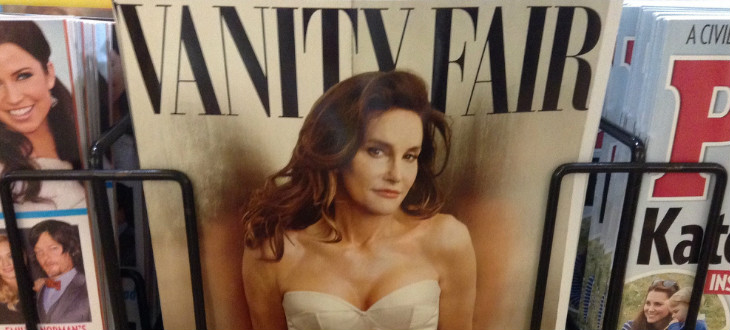Transgender people are now more in the news than ever before. But if real progress is going to be made, we need to address issues of freedom of speech for all and look for transgender icons beyond Caitlyn Jenner, argues Alex Hopkins.
In the town that I grew up in everyone presumed to know who the local transgender people were. The words used to describe the woman who walked down the high street each week varied. I clearly remember standing outside the supermarket as she passed by while a mob of ignorant teenagers jeered at her, calling her a “freak”. Others – my parents included – avoided vitriol but instead employed the language of pity. “I just can’t understand it. It’s not their fault though,” my mother once said, before adding, “but they are very brave.”
Thirty years later transgender people have made huge advances. They’re more visible than they’ve ever been and stories of courage are regularly covered in the gay press – and mainstream media. It has been life-affirming to watch as trans people – for too long treated as pariahs who encountered horrific abuse on a daily basis – finally move towards the acceptance that they deserve - to be treated as equals in society.
The campaign for international transgender rights is now well underway. In 2009 Global Action for Trans Equality (GATE) was founded, a think-tank for transgender rights. It lobbies the United Nations and the World Health Organisation, and on June 17 contributed to a resolution presented by South Africa along with Brazil to the UN Human Rights Council, concerning human rights on sexual orientation and gender identity. Transgender rights are also now considered human rights by Amnesty International, but it is Argentina who have led the way. In September 2015, they passed a ground-breaking law requiring the country’s Buenos Aires province to fill at least 1% of government jobs with trans people. This followed another pioneering piece of legislation in 2012, the gender identity law, which allowed citizens to change their gender without any other requirements.
Europe has also made significant progress, with Spain, in 2007, becoming the first Catholic country to pass a law permitting people to officially change their gender identity. Similar legislation has come into play in Portugal, Malta, Colombia and Ireland – although as important as these laws are, the situation for trans people in countries such as Colombia and Brazil remains perilous, with trans murders a huge issue.
Gay, lesbian and bisexual people – who have historically fought prejudice and now enjoy unprecedented freedoms – have a moral responsibility to support trans people in their fight for acceptance, safety and equality. But at the same time, it’s concerning that some more outspoken trans activists have been too quick to condemn anyone who does not agree with them and brand them as “transphobic” as a result.
The recent furore surrounding the world’s foremost campaigner for LGBT rights, Peter Tatchell – who received abuse from supporters of trans rights after co-writing a letter in support of free speech when Cambridge University was called upon to withdraw a speaking engagement to Germaine Greer in light of comments she made about trans people - has made this painfully apparent. Moreover, other incidences of attempting to ban speakers from universities – the very places in which we debate and shape future attitudes – have served just to shut down freedom of speech. Only by listening to views that we may not entirely agree with, are we able to mould and reinforce our own arguments. This is something that all human rights campaigners should be aware of. Maturity and respect is required on all sides and the concern is that by demonising prominent thinkers who have conflicting views, some trans activists risk alienating other parts of the LGBT community – people whom they need as allies.
We also need to be more discerning about whom we elevate to iconic status in the trans community. Transgender visibility is vital and must be actively encouraged, but for the trans cause to grow it requires intelligent advocates who believe in equality not only for other trans people but for all minorities. Almost a year ago, the former athlete Bruce Jenner came out as a trans woman, changing her name to Caitlyn. Since then barely a week has passed without her presence in the news. Most recently, she became a model for H&M Sport and partnered with MAC cosmetics. This firmly places a trans person in the mainstream and should be welcomed. It has the potential to change different generations’ views of trans people and is a massive step forward. Yet at the same time, one has to question the readiness with which the gay media in particular has embraced Jenner - who is a Ted Cruz supporting Republican - with her dubious views about the rights of women, gay men and lesbians.
Caitlyn Jenner, Formerly Bruce, Vanity Fair Cover on News Stands, 6/2015, by Mike Mozart of TheToyChannel and JeepersMedia on YouTube
Becoming blinkered to a person’s reprehensible political views just because they are trans – and giving that person a seemingly ever-expanding platform on which to express those standpoints – not only silences the thousands of other trans people who believe in equality for all, but marginalises those groups – women, gays and lesbians, ethnic minorities – who won rights through long, painful struggles decades ago – and indeed fight to hold on to them.
Transgender people are now urgently in need of new spokespeople who can take the fight to the next level without denigrating the human rights of others. Until then “trans liberation” is stuck in a limbo, existing as often little more than a self-defeating media circus which threatens to damage all of the excellent progress.




Join the conversation
You are posting as a guest. If you have an account, sign in now to post with your account.
Note: Your post will require moderator approval before it will be visible.